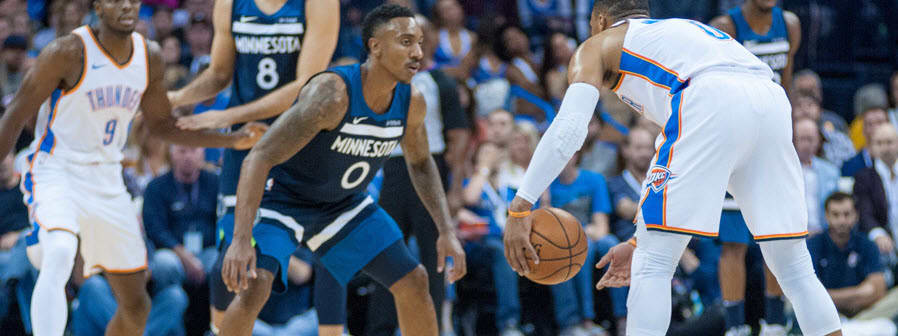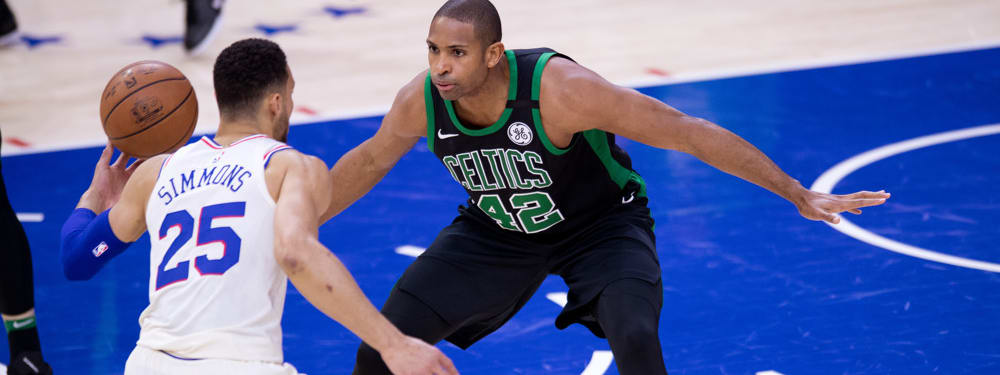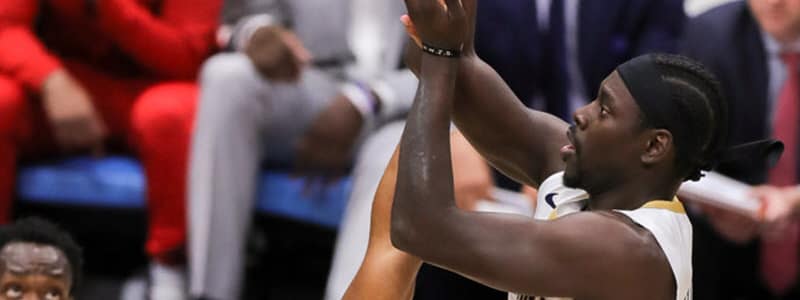Recent RotoWire Articles Featuring Thabo Sefolosha
See More
The veteran was limited to 38 games last season due to MCL surgery, but provided a stable presence on the wing when he took the floor during his first year with Utah. He saw 21.2 minutes per game, averaging 8.2 points, 4.2 rebounds and 1.4 steals while shooting 49.2 percent from the field and 38.1 percent from deep. However, it’s unclear if the same role will be available this season. In Sefolosha’s absence, Royce O'Neale played well during his rookie campaign and the team traded for Jae Crowder. As a result, drafting Sefolosha, even in deep Fantasy leagues, carries significant risk. In addition to his cloudy role, Sefolosha has appeared in over 62 games just twice over the past six years.
Sefolosha, an NBA veteran with 11 years of experience, appeared in just 62 games last season while dealing with a groin injury. When he did take the floor, he posted 7.2 points, 4.4 rebounds, 1.7 assists and 1.5 steals across 25.7 minutes per game while shooting 44.1 percent from the field and going 41-for-120 (34.2 percent) from deep. Primarily a defensive-minded player, Sefolosha has never averaged double-digit points in a season -- his Fantasy value largely coming by way of rebounding and steals. He’ll be joining a team devoid of their starting wing talent from last season, Gordon Hayward, but considering the decent depth the Jazz possess at the position(s), Sefolosha isn’t a lock to see the same workload he did last season. As a result, he can likely be passed up in the majority of Fantasy leagues since he wasn’t especially productive in the solid workload he was given during the 2016-17 campaign. Though, he can be useful in categorical leagues due to his ability to rack up steals.
Sefolosha recovered from a fractured right fibula in time for the start of the 2015-16 season, but was unable to wrest the starting small forward job from Kent Bazemore, who submitted a career-best campaign. Even with Bazemore's breakthrough, the Hawks still had enough room to carve out a sizable rotation role for Sefolosha. Despite coming off the bench for 64 of 75 games, Sefolosha actually saw his court time increase from the season before, finishing with averages of 6.4 points, 4.5 rebounds, 1.4 assists and 1.1 steals across 23.4 minutes per game while shooting a tidy 50.7 percent from the floor. Sefolosha is quite valuable to the Hawks from a real-life perspective for his strong work on the defensive end, but his limited involvement offensively will continue to relegate him to the waiver wire in most leagues. He'll also be at risk at losing out on a few minutes during the upcoming season with the Hawks adding first-round draft picks Taurean Prince and DeAndre' Bembry to the mix.
In his ninth season, Sefolosha averaged 5.3 points, 4.3 rebounds, 1.4 assists, 1.0 steal, and 0.4 blocks in 19 minutes per game through 52 regular season games. He shot 42 percent from the field, 32 percent from beyond the arc, and 78 percent from the free-throw line, missing all of February and most of March because of a calf injury before suffering a right fibula fracture and ligament damage in an off-court incident while being detained by police in April. Since surgery, he has reported progress without giving any estimate on his return to basketball activities. The initial six-month recovery timeline would place his return in October, but it's likely the Hawks will be extremely cautious bring back the man whom coach Mike Budenholzer has said will slide into DeMarre Carroll's vacated spot in the starting lineup. Regardless of how many minutes Sefolosha ultimately plays when he is able to return to action, the defensive stopper has limited upside in fantasy due to his inconsistencies offensively.
One of the league's better perimeter defenders, Sefolosha will be locking up opponents for the Atlanta Hawks this year. Atlanta acquired the veteran stopper via a sign-and-trade deal with Oklahoma City. He'll make $12 million as a Hawk over the next three seasons. A player like Sefolosha – a defensive stopper who contributes next to nothing on the offensive end – is a tough fit on most teams, but with Jeff Teague, Kyle Korver, Al Horford, and Paul Millsap in the mix, the Hawks should have more than enough firepower to cover for Sefolosha's limitations. His defensive ability will give Mike Budenholzer a lot of matchup options. Budenholzer could use Korver and DeMarre Carroll as an offense/defense wing pairing with the first unit and then swap in the combination of Sefolosha and Kent Bazemore to keep up the pressure on both ends of the floor. Sefolosha's well-documented defensive ability hasn't really translated into fantasy relevance. He typically averages more than a steal per game (1.1 per game for his career), but is not a shot blocker (0.3 per game last season), and doesn't contribute much in any other category.
After eight years in the league, we basically know what the Swiss swingman is: a perimeter defender who is a below-average NBA scorer. Despite playing significant minutes, he has never averaged more than 8.5 points and 5.2 rebounds (his averages in his first season with the Thunder in 2008-09). Sefolosha did hit 41.9 percent of his 3-pointers last season, so he can be a long-distance streamer in some head-to-head leagues.
Sefolosha, who missed 23 games last season with a foot injury, is all defense. He's a mediocre shooter (43.2 FGP) and averaged about an assist per game last season. Not that Oklahoma City cares; the team just wants his steady defense and strong rebounding (though his foot injury limited him to a five-year low 3.0 rpg in 21.8 minutes last season). Expect about 25 minutes per game as the starting 2-guard and improved rebounding numbers with about a steal and half a block per game.
Sefolosha is a defensive stalwart who started all 79 games he played in last season. His lack of offensive severely limits his fantasy value. But Thunder aren't looking to him for offense. They'll be happy if he turns in another season season of 25 minutes a game with 1.2 steals and 4.4 rebounds from the 2. He averaged 5.1 points and 1.4 assists last season, splitting minutes with the offensive-minded James Harden. The duo will handle the job again this season, though there's a chance Harden could start. Either way, Sefolosha will still get his minutes as a key cog in the Thunder rotation.
Sefolosha is a frustrating type of player, as he offers little fantasy value in and of himself, but plays enough minutes (in the case of 2009-10, 29 per game) where he's blocking a player who actually would offer value. In fact, Sefolosha started every one of Oklahoma City's games last year. Nor was he necessarily a bad fit for the team: with Durant, Green, and Westbrook running the offense, Sefolosha's main responsibility was playing above-average man-to-man defense and hitting the occasional open jumper. He mostly did the latter, hitting 0.5 threes on 31.3 percent shooting, but nowhere near to the extent that he's worth a fantasy roster spot. The man whom he's blocking, on the other hand – James Harden – might actually have some worth should Sefolosha run into some injuries. In the meantime, the main strength of the Swiss guard will be remaining neutral in diplomatic matters.
Gifted with excellent quickness and good leaping abilities, Sefolosha has as all the tools to develop into one of the league’s premiere defensive stoppers. He was thrust into the starting lineup upon his arrival to Oklahoma City and stepped up to the challenge, averaging 8.9 points, 5.4 boards, 2.1 assists, 1.7 steals, 1.2 blocks and 0.4 threes in 22 starts. Sefolosha has also proven to be a solid complementary player alongside Kevin Durant, Jeff Green, and Russell Westbrook since he does not command the ball. Despite his strong play in those 22 starts last season, Sefolosha will face stiff competition from rookie James Harden for the starting shooting guard spot. It will ultimately boil down to Sefolosha’s ability to spread the floor and convert on long jumpers and three pointers. Unfortunately his three-point percentage has been consistently trending downwards, capped by a very uninspiring 24.3-percent clip during his 23-game stretch with the Thunder. Sefolosha will probably earn about 26-28 minutes of action to start the season, and will see his time on the court either increase or decrease depending on the progress he makes on his outside shot – and also Harden’s development.
Sefolosha has been a nice addition to the Bulls the last two seasons, but he was severely limited by a sore groin and the mid-season acquisition of Hughes last year. Sefolosha can play the two or the three, and fill up the box score on occasion, but minutes will be tough to come by when the Bulls are at full strength.
Sefolosha battled inconsistency and some minor injuries as a rookie but displayed flashes of the tall, defensive-minded guard the Bulls selected as a complement to Kirk Hinrich and Ben Gordon. He used the summer league games this year for a very specific purpose, getting more comfortable on the offensive end, making the simple play and hitting his shots. Look for Sefolosha to see a slight uptick in minutes and be used in three-guard sets ahead of Chris Duhon, though his overall numbers will be limited.
Sefolosha is a tall, defensive-minded guard that can hit the three-pointer as a complement to Ben Gordon. Look for him to be used in three-guard rotations, though his overall numbers will be limited by his lack of playing time.












